Premium Only Content
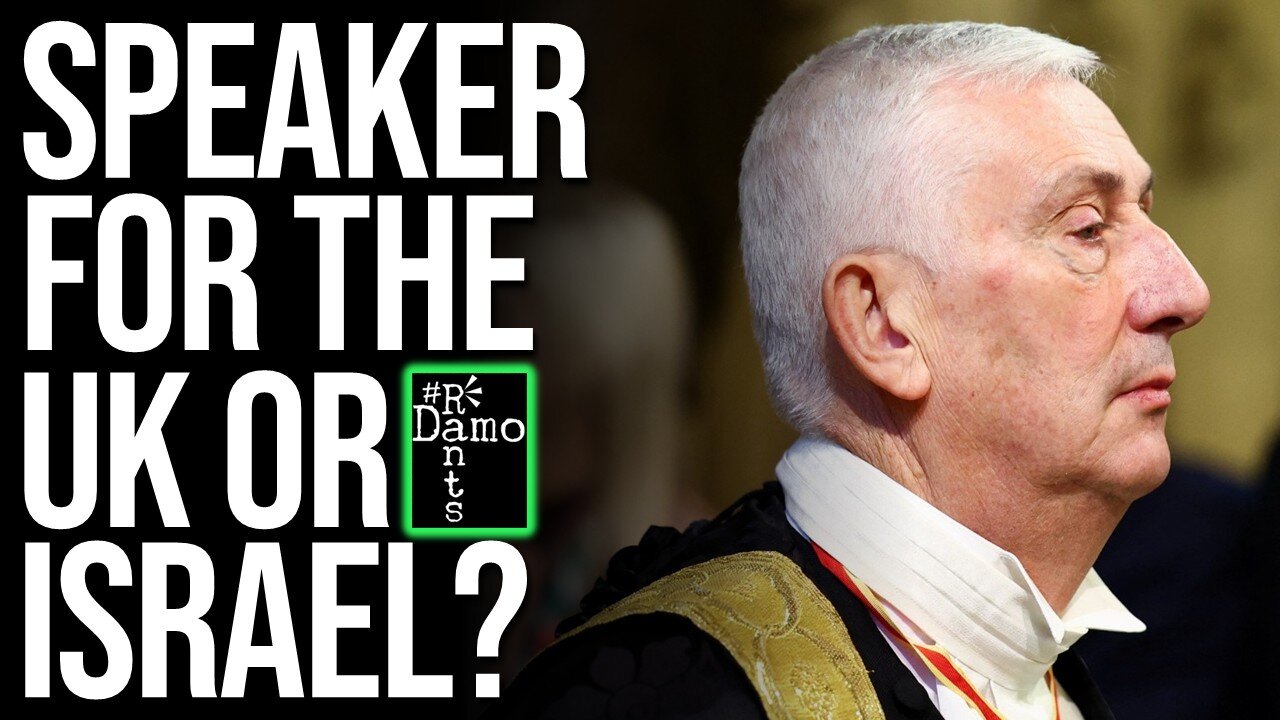
Lindsay Hoyle Hid His Emails — What’s He Afraid You’ll See?
Right, so at a time when the UK already faces growing condemnation both at home and abroad for its ongoing material and diplomatic support of Israel’s genocide of Gaza, it is not Keir Starmer or David Lammy that is today the target of public enmity over their pro Israel proclivities, but the Speaker of the House of Commons who finds himself at the centre of a deepening scandal and one all of his own making. Sir Lindsay Hoyle’s decision to block the release of his own communications with Israeli officials, has revealed not only a personal lapse in judgment but a far more profound institutional crisis. This is not a minor procedural dispute, here, this is the guy who’s job it is to uphold parliamentary standards and rules appearing to be hiding his own actions. The principle of democratic transparency has clashed with parliamentary privilege, and that privilege has won out. The result has been secrecy, impunity, and a chilling message to the British public that the Speaker answers to no one the effect being that they are above the rules and regs they are there to oversee, it’s just not democratic is it, so can we do anything about this?
Right, so the Freedom of Information (FOI) request in question, that has triggered this scandal now engulfing Lindsay Hoyle, submitted by the excellent investigative outlet Declassified UK, sought written correspondence between Hoyle and key political figures surrounding the events the February 21st 2024 debate on Gaza in parliament. This was the same debate where Hoyle broke with parliamentary precedent to allow a Labour amendment — effectively neutralising an SNP motion calling for a ceasefire — to be voted on first, suspending a standing order to do this, so the optics of this move and the motivations of it were heavily questioned. The consequences of that decision were immediate and severe: a political storm erupted, dozens of MPs signed a motion of no confidence in Hoyle, and public anger over Westminster’s pro-Israel bias boiled over. Against this backdrop, the refusal to release Hoyle’s emails appears not as routine administrative discretion, but as the deliberate concealment of potentially damning political conduct.
Hoyle’s apparent suppression of his correspondence during a genocide-related parliamentary controversy reflects not only his own allegedly compromised role but the broader moral collapse of the UK’s political institutions in the face of this ongoing mass atrocity. By invoking parliamentary privilege to bury evidence of his interactions with Israeli officials, Hoyle has moved from Speaker to shield in effect, from referee to partisan actor — protecting not parliamentary democracy, but the United Kingdom’s ongoing complicity in Israel’s crimes in Gaza and whatever role he might have in that himself, because it does make him look rather guilty of something doesn’t it?
To understand the gravity of Lindsay Hoyle’s actions, lets start with the events that prompted Declassified UK’s FOI request.
The February 2024 Commons debate on Gaza has been the most harmful to Hoyle reputationally where it comes to Israel. Initiated by the Scottish National Party (SNP) as part of an Opposition Day motion, the debate was designed to put pressure on the UK government to support an immediate ceasefire in Gaza. The timing was crucial. Israel’s bombardment of Gaza had reached new heights of brutality. Thousands of civilians had been killed. Aid convoys were being blocked or targeted. Hospitals were being destroyed, we know what was going on then and what has continued ever since, so as you can imagine, the world was watching.
Under long-standing parliamentary convention, opposition motions are debated on their own terms. Amendments are tabled, but the motion’s original wording is respected. In this case, however, Hoyle made the unprecedented decision to allow a Labour Party amendment — far weaker in its language and more sympathetic to Israel — to be debated and voted on first. This effectively displaced the SNP’s original motion and avoided forcing Labour MPs to vote explicitly for or against a ceasefire. This breach of precedent enraged opposition parties and prompted accusations that Hoyle had acted as a shield for Keir Starmer rather than a neutral guardian of parliamentary process as he is meant to be.
The day unfolded chaotically. Labour, fearing a rebellion among backbenchers and members outraged by its ambiguous position, drafted its own amendment that softened the demand and reinforced Israel’s “right to self-defence.” Hoyle’s decision to allow this amendment to take precedence was an unprecedented manoeuvre. SNP MPs stormed out in protest. Hansard records reflect calls from multiple MPs questioning Hoyle’s neutrality on the floor of the House. A motion of no confidence was tabled, signed by more than seventy MPs across party lines.
Hoyle issued a qualified apology, stating that he had allowed the Labour amendment to “protect MPs from intimidation,” citing attacks on MPs previously as his concern, but he hadn’t mentioned this previously, until he came to offer that apology. Civil society groups, such as the Palestine Solidarity Campaign, issued statements condemning what they saw as the silencing of principled opposition to the UK’s complicity in Gaza. The damage, however, was done. A precedent had been shattered, the neutrality of the Speaker had been called into question, and the suspicion of political interference by outside actors firmly planted in the public consciousness and Hoyle has never really shaken this I don’t think and he certainly hasn’t helped himself now.
Following all of those events therefore, Declassified UK submitted a Freedom of Information request to the House of Commons on the 22nd February 2024. It’s taken this long to get a response. The request sought copies of all communications — including emails, messages, transcripts of calls, and meeting records — exchanged between Hoyle and several senior Labour figures, those named including Keir Starmer, Sue Gray, David Lammy, Anneliese Dodds, Alan Campbell, and Pat McFadden between 19 and 21 February, so in the days running up to that. The request specifically asked for materials relating to the Gaza debate, the Israeli–Hamas war, the procedural decisions regarding Labour’s amendment, and any discussions of Hoyle’s own position as Speaker or peerage prospects.
The Information Commissioner’s Office (ICO), in its published decision notice (IC-302267-S1Z4), confirmed that the request was blocked by Hoyle personally, who issued a certificate under Section 34(3) of the Freedom of Information Act 2000 — a clause that allows public authorities to exempt information relating to “proceedings in Parliament” if they believe disclosure would prejudice parliamentary privilege.
The use of this certificate is rare and its highly controversial. By law, a Section 34(3) certificate makes the exemption conclusive. The ICO cannot override it. The requester cannot appeal it in court. It operates as a legal black box. Even if the content of the emails would reveal undue political interference, collusion with foreign officials, or the suppression of democratic debate, the public has no right to see them, so says the Speaker. Although its not written explicitly so in law, the de facto effect is to place the matter above the law. So this is not simply a procedural matter to be accepted and moved on from. It is a direct affront to democratic oversight. It is just fundamentally undemocratic.
The legal basis for Hoyle’s refusal lies in two primary texts: the Freedom of Information Act 2000, specifically Section 34, and the Bill of Rights 1689, particularly Article 9. The former permits the withholding of information relating to parliamentary proceedings if privilege would be prejudiced. The latter enshrines the principle that “the freedom of speech and debates or proceedings in Parliament ought not to be impeached or questioned in any court or place out of Parliament.”
These principles are vital to protecting parliamentary independence. But when deployed to suppress evidence of the Speaker’s private conversations about a foreign conflict — one under investigation for genocide at that — the net effect is corrosive to say the least. Privilege becomes not a shield for democracy, but for its distortion. In this case, the privilege does not protect parliamentary speech but potentially shields a political fix orchestrated behind closed doors, outside of any formal proceeding.
Moreover, it is critical to note that the Speaker has a direct personal interest in the content of the blocked communications. He is not merely an institutional officer guarding abstract principles here. He is a party to the correspondence, the subject of the allegations, and the final authority over whether the evidence is released. This is a profound conflict of interest, one that would be unacceptable in any court of law or ethical oversight body — yet it is fully permitted within the opaque architecture of British parliamentary privilege.
Lindsay Hoyle’s actions and suppression of correspondence with Israeli officials comes in the context of a personal and familial political history steeped in pro-Israel advocacy as well. His father, Lord Doug Hoyle, was a co-founder of Labour Friends of Israel (LFI) — one of the most influential foreign lobbying groups in Westminster. Doug Hoyle was instrumental in founding LFI in 1957 and maintained close ties with the Israeli Labour Party throughout his career.
Lindsay Hoyle has publicly acknowledged and praised this legacy, referring to his father as a “proud friend of Israel.” While personal admiration for a parent is not in itself damning, the Speaker’s actions — blocking transparency over his own Gaza-related conduct while celebrating a family history tied to pro-Israel lobbying — raise serious questions about impartiality and ideological bias. These concerns are magnified in light of the Speaker’s decision to protect Labour from scrutiny during a Gaza ceasefire debate, and to then suppress records that might reveal collusion with either Labour leadership or Israeli officials.
This incident is part of a broader pattern of British complicity in Israel’s ongoing assault on Gaza, that so many of us are heartily sick of now. The UK continues to license arms to Israel, despite overwhelming evidence that those weapons may be contributing to war crimes. According to Campaign Against Arms Trade (CAAT), the UK has licensed at least £474 million worth of arms to Israel since 2015, including components used in drones, fighter jets, and tanks. This is in direct contradiction to the UK’s obligations under international law, including the Arms Trade Treaty and the ICJ’s interim ruling, which imposed provisional measures on states aiding in potentially genocidal actions.
Diplomatically, the UK has acted as a consistent shield for Israel at the United Nations, voting against or abstaining from resolutions calling for accountability and ceasefire. It has also issued statements justifying Israel’s military actions under the guise of “self-defence,” despite the asymmetry of force and the scale of civilian casualties, not to mention the fact the self defence argument doesn’t apply in the context of an occupied people. The Hoyle affair, therefore, becomes not just a matter of parliamentary secrecy, but one node in a web of institutional complicity stretching from Whitehall to Westminster to the Foreign Office.
Historically, the UK has a long tradition of hiding or delaying the release of information related to human rights abuses and foreign policy misconduct — from the Chagossian expulsions, to the Iraq War legal advice, to the colonial-era suppression of the Mau Mau torture archives. Hoyle’s actions follow this well-worn pattern: suppress the truth under the guise of legal propriety, even when lives are at stake. But unlike those cases, the cover-up here is not decades old or buried in bureaucratic archives. It is live. It is happening during an ongoing genocide.
The implications are dire. Hoyle’s refusal does not merely undermine trust in the Speakership — it strikes at the legitimacy of Parliament itself. If the Speaker cannot be held to account for suppressing correspondence about possible collusion with a foreign government during a genocide debate, which is the conclusion we are drawing, such are the optics, then what mechanisms of democratic accountability remain? If parliamentary privilege is invoked to override public interest in matters of mass atrocity, then what is left of parliamentary democracy?
Well there are potential paths forward here. MPs could introduce reforms to restrict the use of Section 34(3), ensuring it cannot be used to shield the Speaker’s own correspondence. A parliamentary committee could launch an inquiry into the Speaker’s conduct. Civil society could push for judicial review of the certificate, challenging its compatibility with the European Convention on Human Rights (Article 10, freedom of expression and information). Most of all, there must be sustained political pressure — from journalists, activists, and ordinary constituents — demanding transparency and accountability.
Lindsay Hoyle has hidden behind parliamentary privilege to shield himself from scrutiny, claiming it is not in the public interest, surrounding events that are of enormous public interest and all at a moment when the UK’s role in an unfolding genocide demands the utmost openness. His actions have exposed how privilege, secrecy, and foreign lobbying could be being used to override democratic norms and moral responsibility and yet there is no democratic tool available to correct this, which is just insane and is why this story needs to gain more traction, if we’re ever going to change that.
This antidemocratic sentiment is being driven by the government itself of course, not just in relation to these possible conversations between themselves, then in opposition with Lindsay Hoyle, but in how they respond to the general public too, as a Brighton woman found out to her cost when she wrote to her MP about Gaza and had the police arrest her at 4 in the morning for doing so. Get all the details of that story in this video recommendation here as your suggested next watch.
Please do also hit like, share and subscribe if you haven’t done so already so as to ensure you don’t miss out on all new daily content as well as spreading the word and helping to support the channel at the same time which is very much appreciated, holding power to account for ordinary working class people and I will hopefully catch you on the next vid. Cheers folks.
-
 1:47:16
1:47:16
Tundra Tactical
8 hours ago $90.27 earnedGlock Interview From Beyond The Grave//Whats the Future of Home Training??
34K5 -
 2:16:35
2:16:35
BlackDiamondGunsandGear
7 hours agoEBT Apocalypse? / Snap Down SHTF / After Hours Armory
13K6 -
 14:05
14:05
Sideserf Cake Studio
18 hours ago $10.99 earnedHYPERREALISTIC HAND CAKE GLOW-UP (Old vs. New) 💅
43.7K6 -
 28:37
28:37
marcushouse
20 hours ago $6.02 earnedSpaceX Just Dropped the Biggest Starship Lander Update in Years! 🤯
18.7K6 -
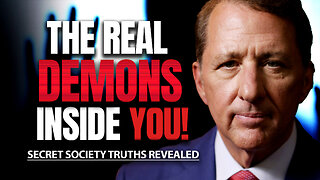 14:54
14:54
The Kevin Trudeau Show Limitless
3 days agoThe Hidden Force Running Your Life
94.7K20 -
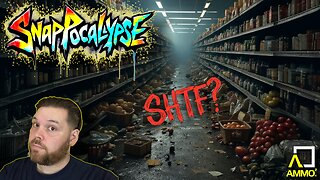 2:16:35
2:16:35
DLDAfterDark
7 hours ago $3.67 earnedIs The "SnapPocalypse" A Real Concern? Are You Prepared For SHTF? What Are Some Considerations?
18.5K9 -
 19:58
19:58
TampaAerialMedia
18 hours ago $6.07 earnedKEY LARGO - Florida Keys Part 1 - Snorkeling, Restaurants,
31.2K17 -
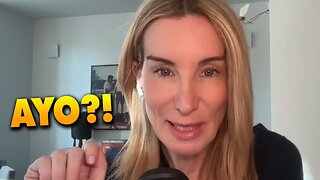 1:23
1:23
Memology 101
2 days ago $6.03 earnedFar-left ghoul wants conservatives DEAD, warns Dems to get on board or THEY ARE NEXT
26.1K57 -
 3:27:27
3:27:27
SavageJayGatsby
8 hours ago🔥🌶️ Spicy Saturday – BITE Edition! 🌶️🔥
54.4K6 -
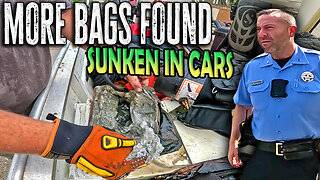 26:09
26:09
Exploring With Nug
18 hours ago $12.13 earned13 Cold Cases in New Orleans What We Discovered Beneath the Surface!
51.5K22